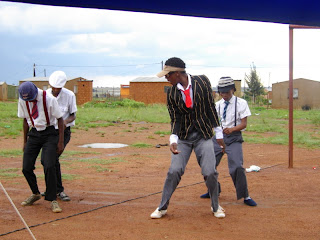 my new family the sKosanas, going out to burn trash
my new family the sKosanas, going out to burn trashEach day has it’s unique ability to open to something I never thought it would be. What I mean is- I am never able to predict where my day may take me. There is some sort of engine which encourages you each morning to make a mental plan for the day that is folding in front of you, what I am trying my best to do instead, is let this guide have its place in my back pocket but not so much be held to it. I often begin the day thinking it will be such a bore, forgetting that my work here in SA is so unpredictable and wonderful in that. Whether making a friend (a new part of my experience as I am able to build relationships with community members now rather than only be their neighbor to greet), or receiving thanks from a stranger far across the way (what a wonder that my white skin can still be seen so far away), or gifted a jar of home-made apricot jam that has a smile of an old Gogo attached to it (and a gathering where communication is small but appreciated by both participants). I think this is why life here is so favorable by an outsider like me while many village residents call it boring. I am in a new, each moment I walk outside my room and gated home.
my bedroom tin roof
Of course, I am starting to get worn down from the constant hellos. Wishing to be invisible for just a few moments, if I let it get to me I really crave the time to myself-to read or paint. This is difficult to come by though with small children wanting my attention or Gogo sitting at my side every moment (a method of comforting according to culture), which leads to additional challenges.
I am currently staying with a women and her grandchild (I refer to this women as Gogo-grandmother in IsNdebele). She has 4 adult children that are doing great things in their lives (all are employed and working and living away in neighboring large cities).
On the evening of October 31, I moved into my new home. Situated apart from the main house; I stay in one of the 4 rooms that are removed and have in a previous life been home to her children. It is traditional that once the children are at a “suitable age”, determined by the parents, they are moved to their own room, no longer asked to share with their siblings. Most adults* live with their parents until they are married, and the parents will award “the adult” with their own room outside of the house, *if finances allow. My Gogo lost her husband 10 years ago as well as 2 daughters. The causes of these deaths are unknown*. *Seldom deaths have a known cause attached to them, many people fear the death sentence of their identified illness, the stigma surrounding the subject or lack of confidentiality in the workplace, hospitals, etc.. According to the grandchildren, all had been ill before passing.
Gogo lives comfortable in this home for plenty and yard extending greener and larger than I have ever seen in SA. She also has several fruit trees (mulberry, apricot, peach, mango) for which I am already reaping the benefits of. The grandchild, Sinaye (SSS-Nigh-Ae) I am staying with has just turned 4 yrs.
Sinaye, first day of preschool
Many of you all-know (despite my chosen profession),that I am not one to enjoy small children, however I am trying my best to be patient with this little one. She has the same tendencies as any small child to want to play and uses like many South Africans an indirect approach to questioning, saying to me everyday in IsiNdebele, “Will anyone play with your toys today?” She will begin attending school next year (January) so I am looking forward to helping her with her studies. Gogo and Snia (the littlun-“Lord of the Flies”lovers) both speak a mix of Afrikans and isiZulu. Our communication is fine though, sometimes I return from school with all sorts of complains I just let out and she listens, which is sometimes all one needs. We laugh a great deal when we do try to communicate- something like a task she wants me to complete for her, a great deal of acting takes place. Ngithanda(I like)! Back when we were searching for a home for me, she was adamant in expressing her interest for education and her thanks for the work I was doing, this is well-observed in her lovely family. Their visits include plenty of English conversation, which I thoroughly enjoy.
my bed
So no mud-hut haley? This is true. Much time here (for now)is spent considering that this may not be the PC experience I had expected. With that being said, I don’t doubt that my life is extremely different then yours and that the traveling I will be able to take part in is far greater than I could ever afford or make time for in the states. So, in many ways it is what I had wished for. I wished to help people and learn a great deal about myself in all of the travels. I do have plenty of flies, barn yard animals and vegetables as hoped. The new people I am meeting have a spirit much different than anything I have met in America-that includes my gobs of international friends from University, must have something to do with context. The situations I am placed in are exactly what I love and joyfully take part in. Singing with the women cooks or listening to my Principal give me purpose to sleep-deprivation and remedies including “sprinkling the blood of jesus” on all that is my room.
Gogo and I can speak to one another a bit, she has definitely taken to me as I have accepted assisting her in the cleaning of her large abode for her daughters’ “traditional wedding”.
Ndebele traditional blanket the bride will wear holding candies and presents for people to tear off
Washing windows, removing, cleaning, and replacing lace-drapes, tending to the plenty of blankets for the visiting family, I found the work exhausting but exactly what I needed in those early awkward moments of staying with someone new. I think now we are better off, although I think her and her mother are subtly relinquishing their feeling of shame for the poor white girl who has moved in their home-with family so far away. I am able to begin preparing food for myself here, which is possibly the single most activity I was looking forward to once I had my own stay. I am partial to eating tomatoes, green pepper, onion salads. I hope to continue with a veggie routine in hopes of losing the weight I gained from training service. However, when family visits like they have for the wedding, it is difficult to resist the heaping plate of rice, salads and chicken. I try to explain that these dishes aren’t taken so well by my bod, but in return receive shocked reaction to my raw vegetable eats and advising that they drink the boiled remains of the green-beans, gogo thought this all funny, and suggested that soon I would tell them her grass was healthy to eat(would she even believe people do eat grass smoothies?).

I use the main house kitchen and keep a few items in my gogo’s fridge. In my room I have an electric kettle to heat my bath water and take tea. My room holds a desk taken from my intermediate school, and a bed and dresser provided by the department of education.
What is predictable now-a-days: that my grade R-3 goodbye recognition ceremony will include the following: the thong song and sexual-healing song, a skit including guns, killing, making fun of corporal punishment. When there is a gathering like such it is normal for guests to bring their own plates and cups.
Cold drink(pop/soda) has a sort of euphoric reaction in its taster, demonstrating that alcohol may not always be the means of relaxing after a meal. This may be because it gathers its guests together to enjoy a 2 liter bottle that will surely leave you fuller than your closing meal.
entertainment at an AIDS testing drive 
A fulfilling afternoon spent handing out condoms (some people asking for more than 3 packs of 2 condoms-to ensure users are building a sexual relationship not just a one-time fling) and informing and inviting community members to an AIDS testing can end unpleasantly as the Sisters(nurses) administering the tests- leave the site unannounced because participation is lower than expected.
Kids clapping their hands twice and then holding open palms in apprciation for what it is you are to gift them.
Examining the community:
School is ending; the schools will start again in January. During my time arriving in Gemsbokspruit I have become familiar with the people of this community. I have begun to identify the needs of the area and begun practicing a few methods of intervening. PC set up a routine of weekly projects that introduced us to different sectors of our new homes, which better attempted to ease our investigations and questioning. Within a weeks work I usually found out a few details that will be found valuable in later planning.
desk and hung cards and pics
Some of these shinning star moments are the following:
The intermediate school has a great amount of text the department of education has provided and alongside educators I have been able to organize this resource for better educator accessibility. Gathering with a small girls group, venturing to our shopping town together and taking “silent” hikes has been enjoyable by the grade 6 learners and myself. Practicing English learning methods with a counterpart had its highlights that demonstrated what I was suggesting could be implemented in SA educator classrooms. Working with the learners during these weeks was especially fulfilling as I was able to be back in the classroom working with learners, despite their young age, a smile from a young one always makes the day a joy. Speaking in isNdebele was rewarded with learners eager to follow along with my directions. Reading and writing are elements in the classroom that these learners yearn for. Can you believe that? Go ahead and experiment, but I promise that learners repeating a list of sight words rather than reading and writing is no more fun than counting the flies on your bed (something I inevitable take part in daily). My work included discussing with the educator why these elements may be helpful in building learner ability to read and write. I took my fair share of ridicule from the counterpart but stood strong when questioned whether I had ever taught young children, (which theoretically I had not done, but hey I have a good idea what I am talking about).
Some from my journal:
On this cold dreary morning, I prefer to only wash my face, no matter that I can heat the what to my liking, I prefer not to see my round stomach nor can I waste a minute more as I have woken late-too much comfort in ones bed makes for a difficult time outside in the rain and cold. Trudging to school I am hoping one of my educators will pass my way by car-this is just the right time I would prefer to have a lift, the endless down pours this past week make for deep puddles in the red-orange grounds and up ahead I am imagining it will be a great number of wet steps. Vivian (N.V. as some refer to her sounding like envy) has stopped and I jump in. Her defrost is not working and she is frantically cleaning the windows while dodging deep wholes in the rode and small children on foot. I was dreading this morning as my principal’s sister has passed and it had been a surprise and quite the dreary past week of funeral preparation. Days following the services are surely to be dismal-leaving an outsider such as myself uncomfortable in the unfamiliarity, I take this as a time to step back into the observer role. It is assumed that I will take the class of one of the educators who is also a sister of the principal. I agree but warn, it will be my last time(many educators like to take advantage of volunteer’s in their classroom and choose to take tea rather than teach) and only a half day as I must make my rounds to my other schools.
This morning with the littleones starts off slower than the past days as the chilled environment slows the comfort process a class with me seems to exude(due to positive expectations, classroom discipline, and classroom management). Increased learner progress is observed these last few weeks-learners are using their English frequently, despite their surrounding disarray. Broken windows are the works of a burglar that educators identify as men of this community tarnishing their own family’s education. The burglars are after the metal in the hinges and window lock. Windows are splashed with red plaint to prevent thieves from taking the glass and selling it.
The A-B-C are lead by my morning voice and directed by two learners with ruler in hand pointing to the letters. This is a new approach which I hope can meld the “learner-center model” and deficient educator abilities-often complain of her hurtful elements. A grade 3 English class requires enthusiasm to motivate learners that have struggles at home (fundamental needs unfulfilled-food, love, shelter). I notice that the learners are taking to the new routine and are excited to sound out the letters and motion their outline with their bodies. They look forward to being called to the ground for reading time and then return to their seats to read themselves. As the class progresses, I experience highs and lows in gauging knowledge gained (assessing these concepts without a home-language educator is difficult) and the knowledge I wish I had concerning English-second language learners.



















































